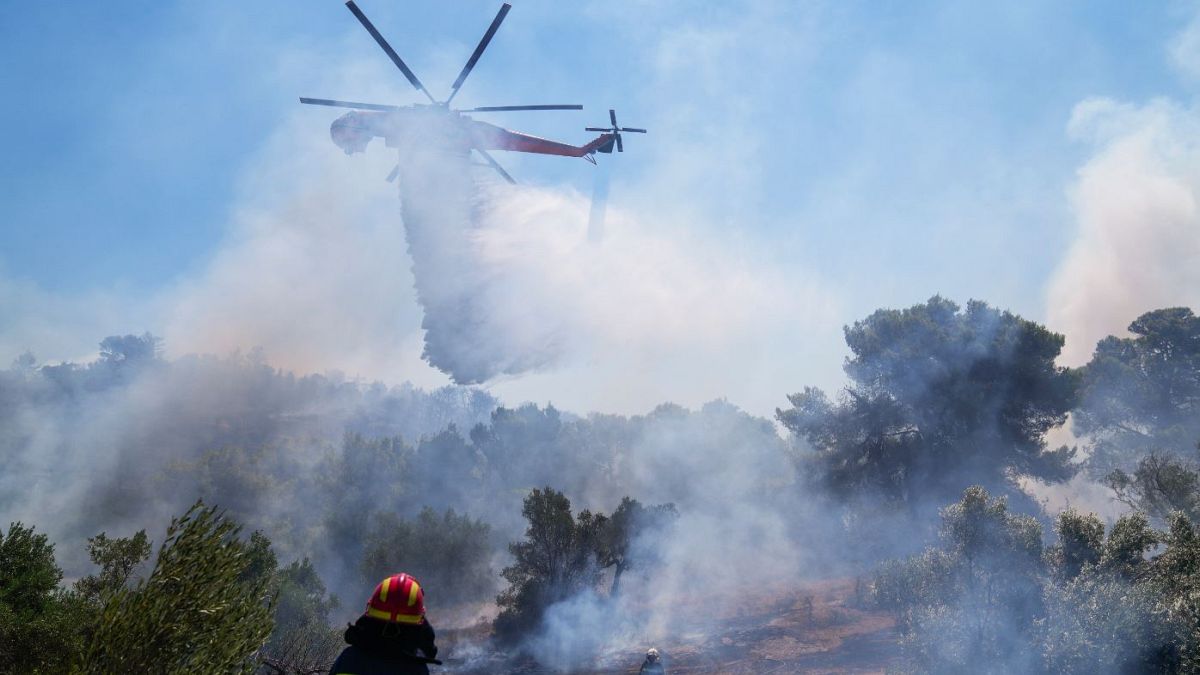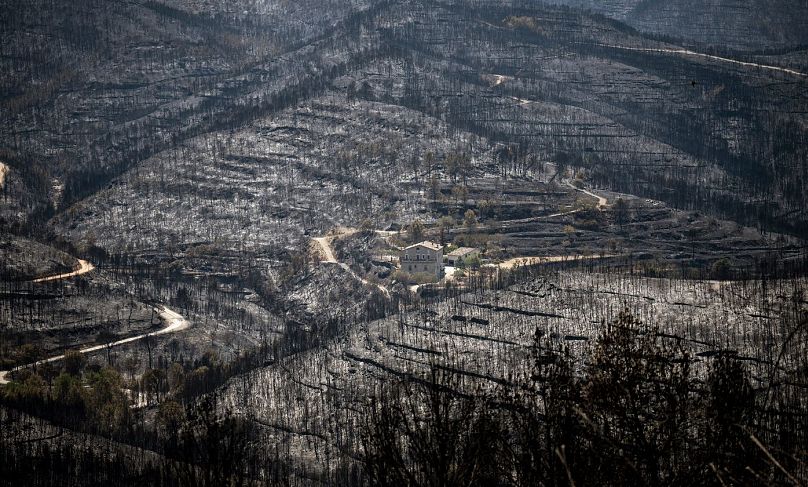The extreme temperatures across the continent have sparked fires, forced people to be evacuated from their homes and caused medical emergencies for vulnerable people.
A heatwave that brought record high temperatures to countries across Europe is moving further north and east on Wednesday as it continues to engulf the continent.
Southern Belgium and parts of west and southwest Germany are forecast to peak above 40°C on Wednesday.
In Germany, several cities already broke the 40-degree barrier on Tuesday, with the DWD weather service forecasting temperatures up to +41°C along the River Rhine on Wednesday.
The Netherlands saw temperatures in Maastricht of +38.9°C on Tuesday with that number expected to be surpassed on Wednesday.
In northern France, hundreds of people were evacuated from their homes as high temperatures sparked fires that destroyed more than a thousand hectares of vegetation in Brittany.
In England, where temperature records were smashed on Tuesday, the Mayor of London said his city's firefighters had their busiest day responding to calls since World War Two.
Sadiq Khan told BBC News that on a normal day, fire departments get around 350 calls but on Tuesday they dealt with more than 2,600.
A "major incident" was declared in London on Tuesday with 250 firefighters deployed to tackle grassland fires in south and east London, while a large blaze in the village of Wennington near the UK capital burnt homes and fields.
Some 175 firefighters tackled a fire in Upminster, with smoke pouring across the M25 motorway; and another 85 firefighters attended two fires in woods near the London commuter town of Croydon.
Thousands evacuated in France and Spain
Thousands of people were also evacuated in France and Spain on Tuesday as water-bombing planes scrambled to extinguish flames in tinder-dry forests.
Two people were killed in the fires in Spain that Prime Minister Pedro Sánchez has blamed on global warming.
The body of a 69-year-old sheep farmer was found on Monday in the northwestern Zamora province near where a 62-year-old firefighter died a day earlier when he was trapped by flames.
More than 30 forest fires around Spain have forced the evacuation of thousands of people and blackened 220 square kilometres of land.
“Climate change kills,” Sánchez said Monday during a visit to the Extremadura region. “It kills people, it kills our ecosystems and biodiversity.”
At least 1,500 heat-related deaths have been reported in the heat wave in Spain and neighbouring Portugal, where temperatures reached 47°C earlier this month.
Much cooler weather on Monday helped around 600 Portuguese firefighters tackle four major fires in the north of the country.
Authorities also discovered the bodies of an elderly couple inside a burned-out vehicle near Murça. On Friday, a Portuguese pilot died when his aircraft crashed as it battled a wildfire in the northern municipality of Torre de Moncorvo.
In total, more than 37,000 people have also been forced from their homes and summer vacation spots in the southern Gironde region in France since the wildfires began on July 12.
Authorities evacuated more towns, moving another 14,900 people from areas that could find themselves in the path of the fires and choking smoke.
One man was detained on suspicion of deliberately starting a fire near Bordeaux, French prosecutors said in a statement.
Authorities in the Saône-et-Loire have confirmed that around 15 dogs died inside a locked caravan amid the heatwave. Investigators believe the animals were being bred illegally.
President Emmanuel Macron was due to visit the Gironde region on Wednesday amid improved weather conditions.
Concern over fresh wildfires in Greece, Italy and Slovenia
Hundreds of Greek firefighters were deployed on Wednesday morning to extinguish a wildfire north of the capital city, Athens.
The blaze has already destroyed a number of homes and is threatening to engulf the densely populated suburb of Gerakas, at the foot of Mount Penteli. At least two people were hospitalised with breathing problems and minor burns.
"Due to the intensity and speed of the winds, the fire constantly changed direction throughout the night, making it difficult work," a fire brigade spokesperson told reporters.
Nearly 600 people have been evacuated from several towns, a children's hospital and the Athens National Observatory as a precaution.
The Greek prime minister has also convened a crisis unit to try to deal with the situation.
More than 1,300 square kilometres of land was damaged by wildfires in Greece last year, the worst damage recorded since 2007.
Fire officials in the Italian region of Tuscany were also battling a wildfire on Wednesday that forced 500 people to evacuate.
An estimated 600 hectares of land have been destroyed, while smoke from the blaze has forced a shipbuilding plant to shut down.
The region's governor Eugenio Giani said on Twitter that the fire had also caused some liquefied gas tanks to explode.
Nine cities across Italy were on the country's highest heatwave alert on Wednesday.
Meanwhile, Slovenian firefighters were also deployed at the Italian border as a major wildfire broke out in a woodland area, forcing several local villages to evacuate residents.
Climate scientists say climate change will continue to make weather more extreme and wildfires more frequent and destructive unless governments take decisive action to stop it.
Petteri Taalas, the Secretary-General of the World Meteorological Organization, said more frequent and more extreme heat waves were an inevitable consequence of climate change.
“In the future, these kinds of heat waves are going to be normal. We will see stronger extremes," Taalas said in a statement on Tuesday. “I hope that this will be a wake-up call for governments.”

